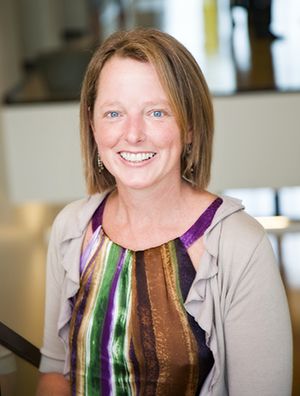Molly Rapert
 Associate Professor of Marketing
Associate Professor of Marketing
Ph.D., Marketing, Memphis State University
M.S., Business Administration, University of Arkansas
mrapert@walton.uark.edu
In her own words ...
My favorite thing about working with Honors College students is ... Because they have been the recipients of resources (whether scholarships, time, energy) they seem particularly open to paying those blessings forward to others - it is fun to open the door to showing them ways to make that happen.
Something most people don't know about me is ... I cheat at cards :) I'm terribly honest - I'll even admit it - but I can't stand to lose.
A marketing strategy most likely to get my attention ... I like "quiet, sentimental" ads - not the loud, boisterous ones that tend to win all the awards and get all the attention.
The place I’ve most loved traveling to is ... Addis Ababa, Ethiopia - we traveled there in 2001 when we met our adopted daughter Marie for the first time. Amazing country with the most generous people I have ever known.
I’m proud to call Fayetteville home because ... The people here are irreplaceable; the sense of community that I feel on this campus is genuine and deep, rivaled only by the ties that I feel with the community at large - the public school system, the small business environment here, the nonprofit organizations...I can't imagine that another town brings all of these pieces together in such a perfect way.
About her research:
What inspires people to buy from a company such as Toms, which donates a pair of shoes
to a child in need for every pair purchased? Molly Rapert thinks personality type
might be the answer. She and a Clemson University professor are teaming to study the
phenomenon known as consumer generosity. Their research shows that a predisposition
to generosity influences such buying decisions more than age, gender or life stage.
People who have children, whether at home or grown, also tend to shop more generously,
she said.
Another project is looking at the push toward sustainability worldwide and the ways
various consumers respond. Rapert is studying perceptions about sustainability in
India, Italy, Turkey and the U.S. and measuring the impact of those perceptions on
green purchases. It takes an environmentally sophisticated consumer to understand
the benefits of compressed packaging, for example. That awareness influences how much
a person is willing to pay for such products and whether there is a market for them
at all.
Rapert has served as thesis advisor for more than 30 Honors College students since
1999. Students develop their own projects from interests piqued in a wide range of
classes; Rapert sees her role as mentor and cheerleader. “I like talking with honors
students, figuring out what they want in life, what inspires them, and then using
the resources the university has given me to figure out how to make that happen,”
she said. “Writing a thesis is something so many students fear. I love setting that
fear to rest.”
Thesis projects have ranged from the benefits of micro-financing in Africa to the
environmental impact of plastic grocery bags to the country-of-origin effect on consumer coffee buying. Rapert requires thesis students to apply for a SURF and/or Honors College grant to fund their research: 67 percent of students receive one or the other, she said.
Every summer, Rapert accompanies Honors College students on a study abroad program
in Asolo, Italy, where she teaches a course on consumers in China and sub-Saharan
Africa. UA is the only one of the 23 colleges involved to offer substantial grant
funding to students, she said. “The UA Honors College gets a lot of attention” for
its grant support, she said.
Rapert’s innovative teaching style connects students with the real-world resources
they will need to succeed in their careers. Her popular marketing management courses
use no textbooks. Instead, students read current articles, blog posts and other materials
recommended by an advisory board of 16 local executives. Students resist the seminar-style
format for the first few weeks, she said. They’re unsure how they’ll be tested on
the material. “By the end of the semester, they’re all in. The class bridges them
to the real world.”